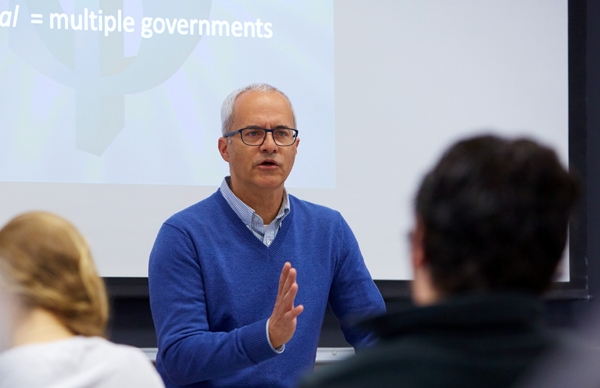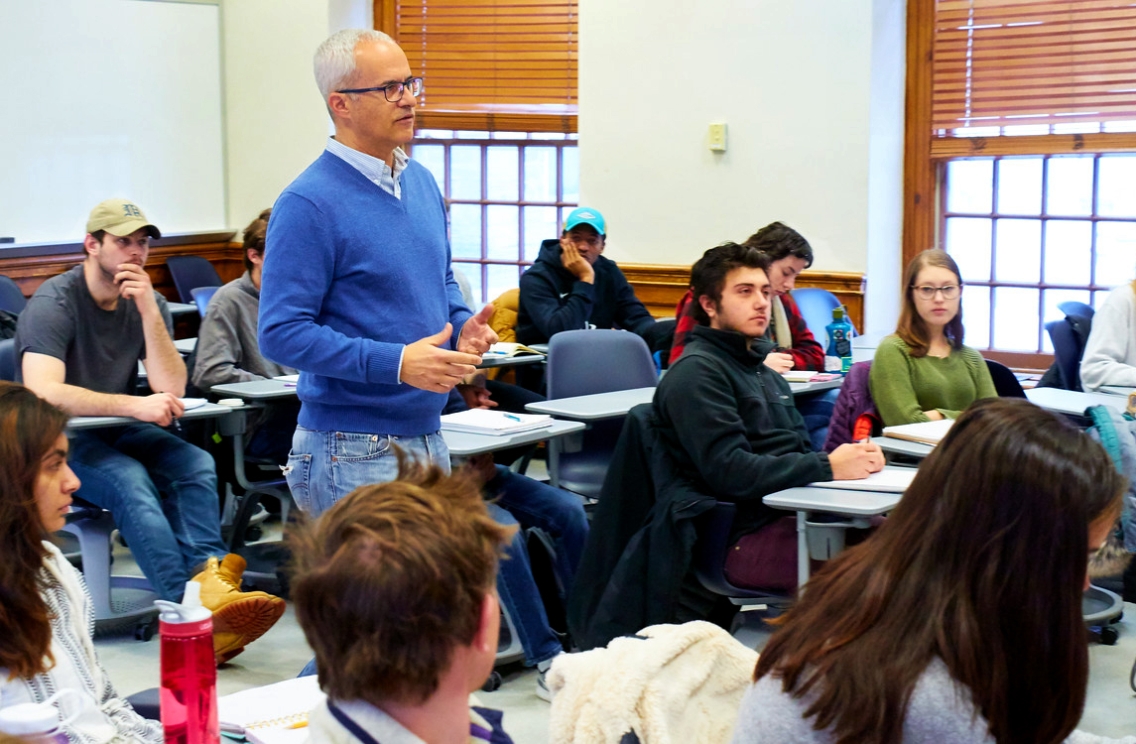Professors of the Practice Enrich the Curriculum

MIDDLEBURY, Vt. – It’s a chilly February morning in Middlebury, and the students in David Torres’s Global Health class are getting settled in their seats. Some are opening their laptops or taking out their notebooks, while others are sipping on their coffees or just trying to stay warm. Torres takes attendance and reminds the class that their research projects will be due at the end of the term. In addition, all 30 students are expected to present their research to the class because the ability to put knowledge into action through effective oral communication is a learning goal for this course.
“Being able to stand up in front of an audience, present an issue, and be persuasive about it is a skill that will serve you well your entire career and your entire life,” Torres tells his class.
Torres, a 1984 Middlebury graduate, is not a professor or an instructor, but he knows what he’s talking about. Torres is a “professor of the practice”—a highly skilled practitioner who integrates academic scholarship with professional experience. The Professors of the Practice Program at Middlebury seeks to prepare students to lead engaged, consequential, and creative lives. It takes the liberal arts one step further by offering real-world perspectives on how classroom knowledge can be applied in the field.
After 22 years with JPMorgan Chase & Co. in Europe, Latin America, and the U.S., Torres gave up his career in banking to join mothers2mothers (m2m), the Cape Town, South Africa–based nonprofit dedicated to preventing mother-to-child transmission of HIV and to improving maternal and child health outcomes. From 2006 when he left JPMorgan, and until last year when Torres relocated to Vermont to take up his teaching position, his work at m2m included a range of initiatives from financial planning to relationship management to providing strategic support for the organization’s fundraising and business development. He was also on m2m’s senior management team and served as secretary to the organization’s U.S. board of directors.
During the 2018–19 academic year, 17 semesterlong courses and 10 winter term courses were taught by professors of the practice, seven of whom are Middlebury alumni. (Each professor of the practice must be sponsored by a faculty member or academic department.) The courses include Reporting and Writing the News with freelance writer and former Newsweek journalist Susan H. Greenberg; Introduction to Finance with Frank Van Gansbeke, an international finance executive fluent in four languages; and Digitizing Folk Music History with Michael Kramer, the author of The Republic of Rock: Music and Citizenship in the Sixties Counterculture (Oxford University Press, 2017).
Other courses were taught in the past year by Professors of the Practice Mabrouka M’Barek, an elected member (2011–2014) of Tunisia’s National Constituent Assembly; Tim Nguyen, former director of investments, finance, and treasury at the University of Connecticut Foundation; and Pam Berenbaum, who was an epidemiologist with the Vermont Department of Health for 10 years. Others include actress and Golden Globe nominee Piper Perabo (Covert Affairs); four-term (2003–2011) Vermont Governor James H. Douglas ’72; street artist and “godfather” of the Trenton, N.J., art scene Will Kasso Condry; and Erin Davis, the director of the film The Land: An Adventure Play Documentary (2015).

“We are now seeing the maturation of our vision for the Professor of the Practice Program that accommodates a more flexible array of appointments,” said Andrea Lloyd, the vice president for academic affairs and dean of the faculty. “This allows us to bring practitioners to campus for short-term residencies and single visits, full semester or winter term courses, or even multisemester commitments. The business/enterprise/finance component”—under the direction of Distinguished College Professor David Colander—“has established a settled rhythm of courses, while the liberal arts portion of the program continues to offer our students opportunities to engage with practitioners in the arts, politics, oratory/public speaking, social entrepreneurship, media and communications, and much more.”
Colander, a member of economics faculty since 1982, recognized long ago that something was missing in his students’ preparation for careers in business or finance. “The economics major is not a pipeline into finance,” he says. “A strong liberal arts training, almost regardless of major, combined with specific training in the practical skills and knowledge used in finance, is the actual pipeline to a job in finance. And the same holds true for just about any career.”
Now Middlebury students can get that “specific training” with courses like Introduction to Finance, Capital Markets, Introduction to Business and Enterprise, Investment Management, Business Ethics, and Accounting, Budgeting, and the Liberal Arts—all taught by professors of the practice.
As Colander explains, “Over the past five years, the Professors of the Practice Program has progressed into a thriving program that is making a significant contribution to the education of Middlebury students.” The program has been highly successful in providing students with an introduction to the specific skills and knowledge used in the real world, and in engaging them in the broader liberal-arts dimension of the subject matter, he said.
Another way to look at the Professors of the Practice Program is to think of it as a “reverse internship,” Colander continued. “Rather than sending students to a real-world internship to learn the skills—a process that is expensive and difficult to scale—the program brings successful people to campus to teach students the skills and knowledge that they would get in an ideal internship.”
And who is the ideal professor of the practice? “It’s someone who is wickedly smart, knowledgeable in teaching, highly successful in his or her field, and willing to work for avocational wages. Finding them is not easy, but it can be done by tapping into our alumni and friends networks [looking for] successful individuals who are willing to teach undergraduates as a way of giving back to society.”
The Professors of the Practice Program at Middlebury is “100 percent funded by donors,” noted Elizabeth Robinson, who oversees the program in her role as associate dean of the College for creativity, engagement, and careers. The majority of support currently comes from the Endeavor Foundation, which supports liberal education in the U.S. by linking together the learning, well-being, and civic development of students.
Back in the classroom, Torres is explaining that the students’ research projects will take the form of an “issue brief”—i.e., a well-written, research-based summary of a health- or development-related topic designed to persuade policy makers to support the issue. And to work with his undergrads in the coming weeks on their oral presentation skills, Torres has invited coaches from Oratory Now to help his students speak with power and precision about whichever global-health issue they have selected.
The class discussion on this Wednesday morning is about the ethics of coercing others to get tested or immunized for disease, and where governments, NGOs, or public-health agencies should draw the line. Torres leads the class discussion like a master teacher, asking open-ended questions and calling on students to contribute to the conversation.
Drawing upon his personal experience with mother2mother’s support for HIV testing and treatment programs in South Africa, and also considering the recent outbreak of measles in Washington State among children who were not immunized, Torres says there is always going to be a measure of distrust whenever help “brought in by other people” arrives in a community.
Torres’s course attempts to place public health issues into a larger context and demonstrate how they are inextricable from the social, cultural, economic, political, and environmental issues that exist in an era of globalization. That his students are considering the lens through which the West views some of the world’s most pressing public health issues—and are trying to do something about them—is a testament to how the liberal arts can relate to the world at large.
By Robert Keren; Photography by Todd Balfour

